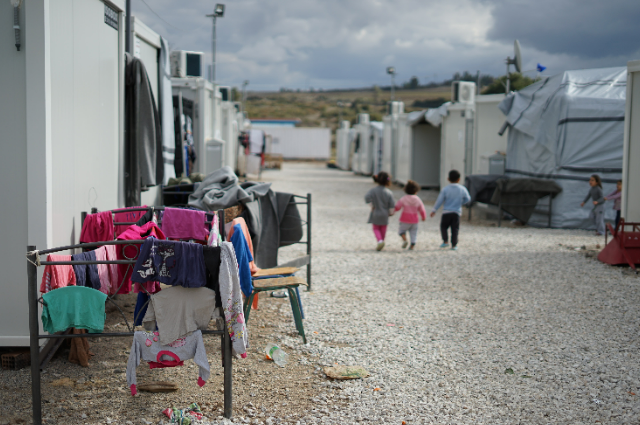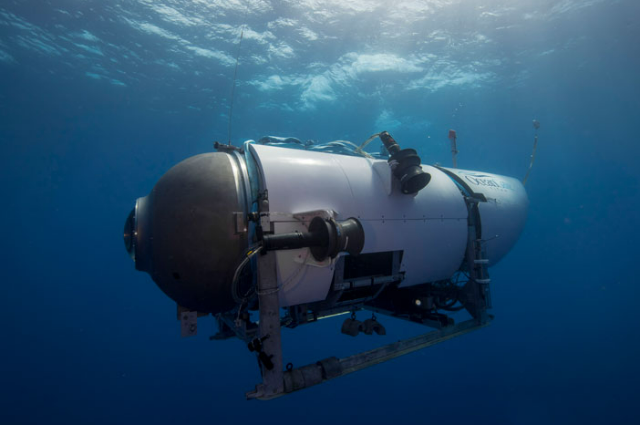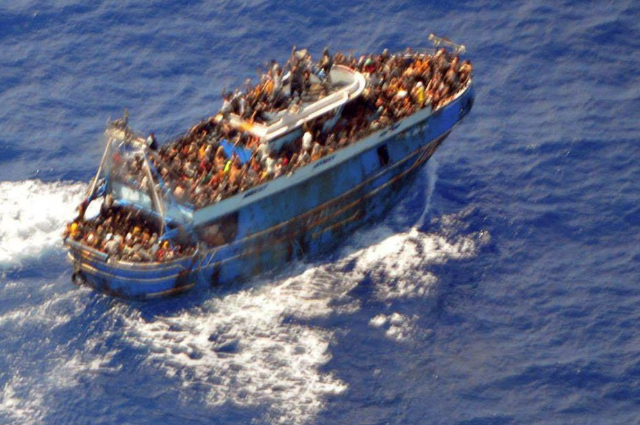
Syrian refugee camp on the outskirts of Athens.
Photo by Julie Ricard on Unsplash
The recent Titan submarine wreckage has taken the limelight everywhere from news channels and newspapers to memes and sketches. At the same time, the sinking of a ship carrying 700 migrants has garnered scanty attention. This raises essential questions about where we are headed as a civilization and how we are steering the course of the international media through our ideologies.
The Titan Sub Tragedy

The Titan submarine.
Image credits: https://oceangateexpeditions.com
For those unaware of the incident (I admire your disconnection with the global media that tries to sell anything and mind you, they do succeed with news selling like hotcakes), here is a brief of what exactly happened:
The Titan submarine was carrying five people to the depths of the North Atlantic Ocean on an expedition organized by OceanGate Expeditions to view the wreckage of the renowned Titanic when it imploded at a depth of 13,000 feet. Communications were lost on June 18, 2023, but the implosion was not confirmed until recently when the debris of the submarine was recovered. A multinational search expedition was organized to hunt for the submarine.
The people aboard the submarine were: the founder of the company who operated the vessel, a British businessman and explorer; a British father and teenage son from a prominent Pakistani family; and a French maritime expert. The passengers had paid a hefty sum of up to $250,000 per person to embark on the expedition which required them to sign a waiver prominently mentioning ‘death’ three times on the first page.
The rescue efforts that are taking place for the submarine (debris) have already incurred costs of millions of dollars. The US and Canadian forces mobilized submarines and aircraft as a part of the rescue mission and specialized systems and diving robots were brought in to scourge the ocean. An interesting point that comes up is that the entire costs of the rescue efforts are to be borne by the government and the company is not obliged to pay for the same. The responsibility of rescuing any individual typically falls on the government with no expectation of reimbursement.
The sinking of the migrant ship

Migrants aboard the fishing boat before it capsized
Source: Hellenic Coast Guard
Firstly, I would like to point out the serious dearth of content for me to even frame this section efficiently. The neglection of this massive accident by concerned stakeholders is utterly disgraceful. Nevertheless, a brief summary of the events that took place is as follows:
A fishing boat carrying hundreds of migrants from Pakistan, Egypt and other regions capsized in the Mediterranean Sea off the shore of Greece. Migrants are embarking on this perilous journey with worsening economic conditions in their home countries. Inflation in Pakistan had reached a record 38 per cent in May resulting in a complete economic meltdown and making conditions almost unliveable for its citizens. With doors closing on all sides, citizens see no other option but to flee and migrate to places with better living conditions, notwithstanding the perilous journey that comes with the hope of a better life.
Citizens see themselves stuck among slacking career growth, crumbling economies and unpredictable weather patterns (like severe flooding in Pakistan) and consider the hardships of migration to be a manageable option.
What’s more, you might ask. This tragedy isn’t the first one to curse this year. There have been two similar tragedies wherein ships with migrants on them were wrecked at sea, but the media coverage for them was, needless to say, as good as absent. Ships capsizing in February and April claimed at least 60 and 57 lives respectively, making the Mediterranean a ‘sea of graves’.
International maritime rules dictate that any vessel in distress must be rescued by others at sea. Notwithstanding this fact, Greek vessels conveniently ignored the sinking migrant ship resulting in the death of several people. Of the 700 migrants, only 104 have been rescued. The spokesman for the Greek coast guard said that ‘any effort to tow the overcrowded trawler or move hundreds of unwilling people onto nearby ships would have been too dangerous.’ Greek authorities have said that the migrants insisted they didn’t need any help, but non-governmental organisations say that they received numerous calls for help.
Where it’s all going wrong?
Leading news agencies have been updating their websites with real-time updates about the sunken submarine and the recovery of its wreckage. Grieving relatives and the aspirations of the passengers on board the submarines have been highlighted time and again. What about the aspirations of the 700 migrants?
Media houses have released various articles titled:
- ‘Teen who died on Titanic sub brought Rubik’s cube with him to break world record’
- ‘Widow who lost husband and son to Titanic sub implosion pays tribute to 'best friends' at memorial’
- ‘Family remembers ‘legend’ Hamish Harding, British billionaire who died in Titanic submarine accident’
But what about the names, dreams, hopes and aspirations of the people who were lost in another part of the world not so far away?
Another new agency has released an article titled ‘Obama slams global fixation with Titanic Sub: What about the 700 migrants…’. This further emphasizes the point that these matters won’t be brought to the limelight until a reputed person of international acclaim highlights their importance.
But again, passing the blame on the media and washing your hands clean is definitely not an option. The media has evolved looking at the demands of the masses, and will continue to work on the same lines unless the basis of these so-called ‘sensational stories’ are challenged. The common man has always tried to climb the ladder of success and fame, and in doing so has only looked up: up at the wealthy aristocracy. This brings age-old conventions into the spotlight and calls for an immediate refashioning of the thought process that we’ve been following since forever. With the importance of human rights being highlighted time and again in the modern scenario, why are situations like this conveniently slipped under the carpet? It is time to retrospect our own actions. Only then will we be successful in steering the media in a direction that will make everyone’s voices heard.
